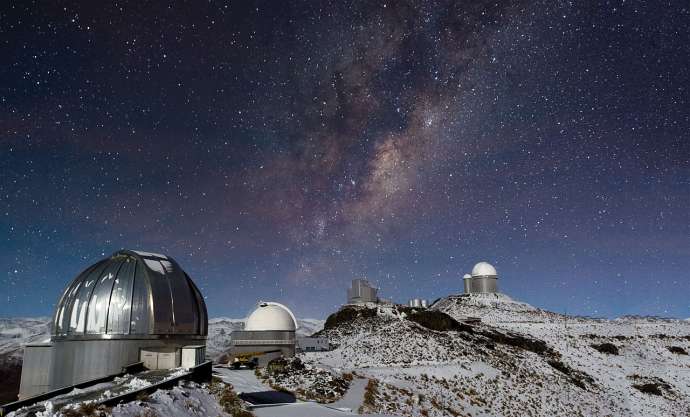Časoris is an online newspaper aimed at children. Each week we’ll take an article and post it here as a Slovene-English dual text.
Prvi slovenski teleskop v Čilu
The first Slovenian telescope in Chile
Written by Dora Adamič, translated by JL Flanner & G Translate
Zakaj ponoči vidiš v mestu manj zvezd kot na podeželju? Zaradi vse večje svetlobne onesnaženosti.
Why do you see fewer stars in the city at night than in the countryside? Due to ever more light pollution.
Ta postaja resen problem tudi za astronome.
This is also becoming a serious problem for astronomers.
Nočno nebo zato raje spremljajo na podeželju ali v gorah, kjer je manj svetlo in se nebesna telesa lažje vidijo.
They therefore prefer to monitor the night sky in the countryside or mountains, where it is less bright and celestial bodies are easier to see.
Univerza v Novi Gorici in astronomska revija Spika bosta v želji, da bi astronomi raziskovali v čim boljših pogojih, pod okriljem izobraževalnega projekta GoChile postavili teleskop v gorah Čila.
The University of Nova Gorica and the astronomy magazine Spika will set up a telescope in the mountains of Chile under the auspices of the GoChile educational project, in order for astronomers to explore in the best possible conditions.
Teleskop se bo nahajal na observatoriju El Sauce na jugu puščave Atacama na nadmorski višini 1560 metrov, kjer najdemo tudi teleskope drugih svetovnih astronomskih organizacij.
The telescope will be located at the El Sauce Observatory in the south of the Atacama Desert at an altitude of 1560 meters, where we also find telescopes from other world astronomical organizations.
Na tej lokaciji je ozračje izredno stabilno in čisto, poleg tega so noči skoraj vse dni v letu temne in jasne. Zato so tamkajšnje opazovalne razmere naravnost vrhunske, morda celo najboljše na svetu.
At this location the atmosphere is extremely stable and clean, in addition, the nights are dark and clear almost every day of the year. That is why the observation conditions there are top-notch, perhaps even the best in the world.
Slovenski teleskop bo tako lahko pripravljen za izjemne astronomske raziskave in fotografije vesolja.
The Slovenian telescope will thus be prepared for exceptional astronomical research and photographs of space.
Raziskovalci bodo nebo lahko opazovali iz Slovenije, saj so teleskop in vsa dodatna oprema avtomatizirani. Enostavno jih lahko upravljajo tudi na daljavo.
Researchers will be able to observe the sky from Slovenia, as the telescope and all accessories are automated. They can also be easily operated remotely.
»Teleskop bo v prvi vrsti namenjen študentom študijske smeri fizika in astrofizika na Fakulteti za naravoslovje Univerze v Novi Gorici in ljubiteljskim astronomom pod okriljem revije Spika,« pravi strokovna vodja projekta prof. dr. Andreja Gomboc.
"The telescope will primarily be intended for students of physics and astrophysics at the Faculty of Natural Sciences, University of Nova Gorica and amateur astronomers under the auspices of the magazine Spika," says the professional project manager Prof. Dr. Andreja Gomboc.
»Na voljo pa bo tudi radovednim dijakom, ki bodo v projektu lahko pridobivali praktične izkušnje z astronomskimi opazovanji.«
"It will also be available to curious students, who will be able to gain practical experience with astronomical observations in the project."
Čeprav se zvezd ne moremo dotakniti, se jim lahko vsaj približamo z astronomskimi raziskavami. Zato je glavno vodilo projekta GoChile: »Več astronomije!«
Although we cannot touch the stars, we can at least approach them with astronomical research. That's why the main guideline of the GoChile project is: "More astronomy!"
Read more stories and improve your Slovene at Časoris, while all our dual texts can be found here.







